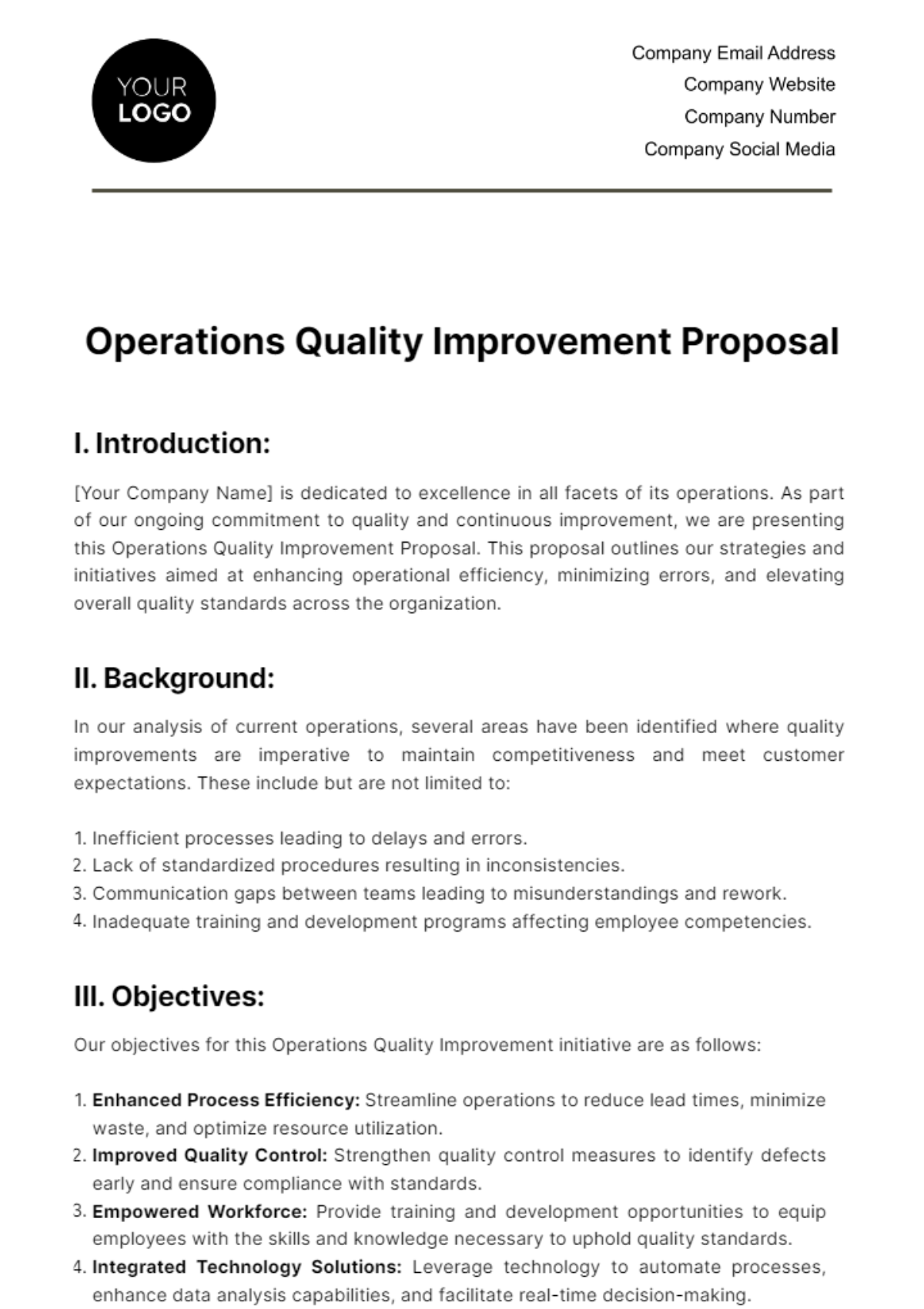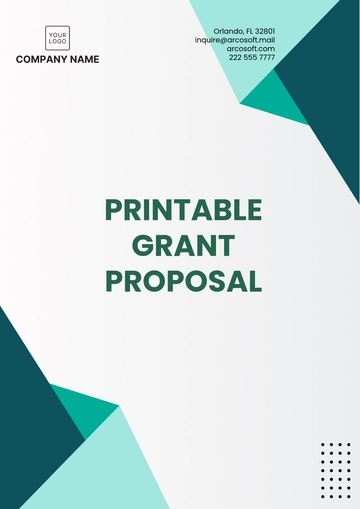Free Operations Quality Improvement Proposal

I. Introduction:
[Your Company Name] is dedicated to excellence in all facets of its operations. As part of our ongoing commitment to quality and continuous improvement, we are presenting this Operations Quality Improvement Proposal. This proposal outlines our strategies and initiatives aimed at enhancing operational efficiency, minimizing errors, and elevating overall quality standards across the organization.
II. Background:
In our analysis of current operations, several areas have been identified where quality improvements are imperative to maintain competitiveness and meet customer expectations. These include but are not limited to:
Inefficient processes leading to delays and errors.
Lack of standardized procedures resulting in inconsistencies.
Communication gaps between teams leading to misunderstandings and rework.
Inadequate training and development programs affecting employee competencies.
III. Objectives:
Our objectives for this Operations Quality Improvement initiative are as follows:
Enhanced Process Efficiency: Streamline operations to reduce lead times, minimize waste, and optimize resource utilization.
Improved Quality Control: Strengthen quality control measures to identify defects early and ensure compliance with standards.
Empowered Workforce: Provide training and development opportunities to equip employees with the skills and knowledge necessary to uphold quality standards.
Integrated Technology Solutions: Leverage technology to automate processes, enhance data analysis capabilities, and facilitate real-time decision-making.
IV. Proposed Initiatives:
A. Process Optimization:
Conduct a thorough review of existing processes to identify inefficiencies and pain points.
Implement lean principles and process reengineering to streamline workflows and eliminate non-value-added activities.
Introduce workflow automation tools to standardize processes and reduce manual errors.
B. Quality Control Measures:
Enhance quality control procedures through the implementation of regular audits and inspections.
Establish clear quality checkpoints at each stage of the production/service delivery process.
Implement corrective and preventive action (CAPA) plans to address root causes of quality issues and prevent recurrence.
C. Employee Training and Development:
Develop comprehensive training programs covering quality management principles, including Six Sigma and Total Quality Management (TQM).
Provide technical training sessions to improve employees' skills and competencies relevant to their roles.
Encourage cross-functional training and knowledge-sharing initiatives to foster collaboration and innovation.
D. Technology Integration:
Invest in advanced technology solutions such as Enterprise Resource Planning (ERP) systems and Quality Management Software (QMS) to improve data visibility and process transparency.
Integrate quality assurance tools into existing systems to automate testing, inspection, and validation processes.
Explore the adoption of Internet of Things (IoT) devices and sensors to monitor equipment performance and detect anomalies in real-time.
V. Timeline:
The proposed initiatives will be implemented over a phased timeline spanning [Timeline Duration], with specific milestones and deliverables outlined as follows:
Phase | Initiatives | Timeline |
|---|---|---|
Phase 1 | Process Optimization and Quality Analysis | [Start Date] - [End Date] |
Phase 2 | Training and Development Programs | [Start Date] - [End Date] |
Phase 3 | Technology Integration and Automation | [Start Date] - [End Date] |
VI. Budget:
The estimated budget for implementing the Operations Quality Improvement initiatives is as follows:
Initiative | Budget Allocation |
|---|---|
Process Optimization | [$0,000] |
Training and Development Programs | [$0,000] |
Technology Integration | [$0,000] |
Contingency and Miscellaneous | [$0,000] |
Total | [$0,000] |
VII. Benefits:
The successful implementation of these initiatives will yield the following benefits:
Improved operational efficiency and productivity.
Reduced errors, defects, and rework.
Enhanced customer satisfaction and loyalty.
Strengthened reputation and competitiveness in the market.
VIII. Conclusion:
By investing in Operations Quality Improvement, [Your Company Name] is poised to achieve significant enhancements in operational performance and quality standards. We are committed to fostering a culture of excellence and continuous improvement across the organization.
For further inquiries or to discuss this proposal in more detail, please don't hesitate to contact us at [Your Company Email] or [Your Company Number].
Thank you for considering our proposal.
Sincerely,
[Your Name]
[Your Position]
[Your Company Name]
- 100% Customizable, free editor
- Access 1 Million+ Templates, photo’s & graphics
- Download or share as a template
- Click and replace photos, graphics, text, backgrounds
- Resize, crop, AI write & more
- Access advanced editor
Enhance operational efficiency and drive continuous improvement with the Operations Quality Improvement Proposal Template from Template.net. This editable and customizable template empowers you to propose and implement quality enhancement initiatives effectively. Streamline your quality improvement process, outline objectives, strategies, and timelines seamlessly. Editable in our Ai Editor Tool, tailor the proposal to suit your organization's specific needs effortlessly. Elevate your operations and foster a culture of excellence.
You may also like
- Research Proposal
- Proposal Request
- Project Proposal
- Grant Proposal
- Photography Proposal
- Job Proposal
- Budget Proposal
- Marketing Proposal
- Branding Proposal
- Advertising Proposal
- Sales Proposal
- Startup Proposal
- Event Proposal
- Creative Proposal
- Restaurant Proposal
- Blank Proposal
- One Page Proposal
- Proposal Report
- IT Proposal
- Non Profit Proposal
- Training Proposal
- Construction Proposal
- School Proposal
- Cleaning Proposal
- Contract Proposal
- HR Proposal
- Travel Agency Proposal
- Small Business Proposal
- Investment Proposal
- Bid Proposal
- Retail Business Proposal
- Sponsorship Proposal
- Academic Proposal
- Partnership Proposal
- Work Proposal
- Agency Proposal
- University Proposal
- Accounting Proposal
- Real Estate Proposal
- Hotel Proposal
- Product Proposal
- Advertising Agency Proposal
- Development Proposal
- Loan Proposal
- Website Proposal
- Nursing Home Proposal
- Financial Proposal
- Salon Proposal
- Freelancer Proposal
- Funding Proposal
- Work from Home Proposal
- Company Proposal
- Consulting Proposal
- Educational Proposal
- Construction Bid Proposal
- Interior Design Proposal
- New Product Proposal
- Sports Proposal
- Corporate Proposal
- Food Proposal
- Property Proposal
- Maintenance Proposal
- Purchase Proposal
- Rental Proposal
- Recruitment Proposal
- Social Media Proposal
- Travel Proposal
- Trip Proposal
- Software Proposal
- Conference Proposal
- Graphic Design Proposal
- Law Firm Proposal
- Medical Proposal
- Music Proposal
- Pricing Proposal
- SEO Proposal
- Strategy Proposal
- Technical Proposal
- Coaching Proposal
- Ecommerce Proposal
- Fundraising Proposal
- Landscaping Proposal
- Charity Proposal
- Contractor Proposal
- Exhibition Proposal
- Art Proposal
- Mobile Proposal
- Equipment Proposal
- Student Proposal
- Engineering Proposal
- Business Proposal





























